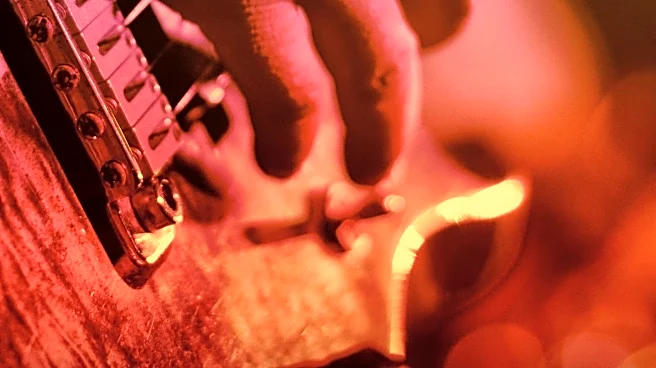What's Happening?
In Suffolk, the Station House at Darsham has become a hub for individuals in recovery from alcohol, drugs, and mental health challenges, thanks to the efforts of Music Prescription CIC and Turning Point. These organizations, with funding from Suffolk County Council, have been conducting weekly music workshops aimed at aiding recovery. Participants, including peer mentor Hannah Cairns, use music as a therapeutic tool to navigate their recovery journeys. The workshops culminate in the annual Recovery's Got Talent showcase, a significant event for the local recovery community. The initiative also complements monthly sober open mic nights in Ipswich and Lowestoft, providing ongoing support for individuals post-recovery.
Why It's Important?
The music workshops in Suffolk represent a vital support system for individuals recovering from addiction and mental health issues. By fostering a creative and supportive environment, these initiatives help participants process emotions and build self-worth, which are crucial for long-term recovery. The workshops and events like Recovery's Got Talent not only offer therapeutic benefits but also combat stigma associated with addiction and mental health challenges. This community-driven approach highlights the importance of creative outlets in recovery and the role of local organizations in providing essential support services.
What's Next?
The upcoming Recovery's Got Talent showcase on October 11 in Bury St Edmunds is expected to be a focal point for the recovery community in Suffolk. It will provide participants with an opportunity to share their musical talents and recovery stories, further strengthening community bonds. Additionally, the continuation of monthly sober open mic nights in Ipswich and Lowestoft will ensure ongoing support for individuals who have completed formal recovery programs, helping them maintain their progress and confidence.
Beyond the Headlines
The music workshops in Suffolk not only aid individual recovery but also contribute to broader societal change by challenging the stigma surrounding addiction and mental health. By promoting creativity and self-expression, these initiatives encourage a more inclusive and understanding community. The success of such programs could inspire similar initiatives in other regions, highlighting the transformative power of music and community support in recovery processes.









